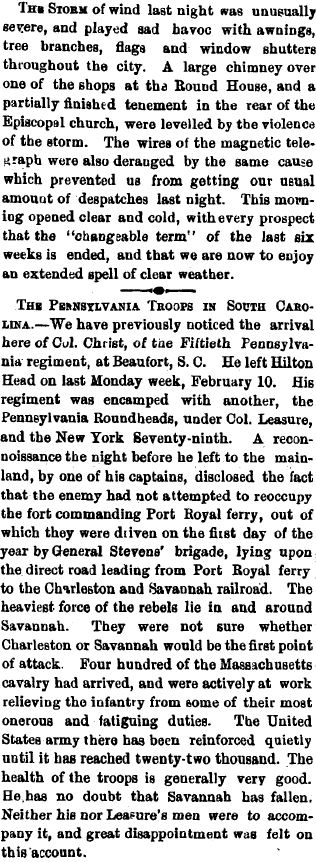News of the Day: February 25, 1862
Posted By Jake Wynn on February 25, 2013
Here is something a little different: news of the day from 151 years ago relating to the Lykens Valley area. The news comes from the Pennsylvania Daily Telegraph of Harrisburg, PA.
According to Luther Reily Kelker’s History of Dauphin County, Pennsylvania, published in 1907, the Pennsylvania Telegraph was first published in 1831 by Theophilus Fenn. Fenn has his own connection to the Lykens Valley, as his nephew Samuel Fenn would later run the Lykens Register. In 1853, the Telegraph gobbled up two local daily newspapers and in 1857 it took up the name The Pennsylvania Daily Telegraph. To the citizens of the era, the paper was known simply as The Telegraph. It was published twice a day during the Civil War and was known for its unwavering support of the Republican Party. The publisher at the time was a man by the name of George Bergner.
Now for the news!
The storm of wind last night was unusually severe, and played sad havoc with awnings, tree branches, flags and window shutters throughout the city. A large chimney over one of the shops at the Round House, and a partially finished tenement in the rear of the Episcopal church, were levelled by the violence of the storm. The wires of the magnetic telegraph were also deranged by the same cause which prevented us from getting our usual amount of despatches last night. This morning opened clear and cold, with every prospect that the “changeable term” of the last six weeks is ended, and that we are now to enjoy an extended spell of clear weather.
THE PENNSYLVANIA TROOPS IN SOUTH CAROLINA –
We have previously noticed the arrival here of Col. Christ, of the 50th Pennsylvania regiment, at Beaufort, S.C. He left Hilton Head on last Monday week, February 10. His regiment was encamped with another, the Pennsylvania Roundheads (100th Pennsylvania Infantry), under Col. Leasure, and the New York Seventy-ninth. A reconnaissance the night before he left to the mainland, by one of his captains, disclosed the fact that the enemy had not attempted to reoccupy the fort commanding Port Royal ferry to the Charleston and Savannah railroad. They were not sure whether Charleston or Savannah would be the first point of attack. Four hundred of the Massachusetts cavalry had arrived, and were actively at work relieving the infantry from some of their most onerous and fatiguing duties. The United States army there has been reinforced quietly until it has reached twenty-two thousand. The health of the troops is generally very good. He has no doubt that Savannah has fallen. Neither his nor Leasure’s men were to accompany it, and great disappointment was felt on this account.
What can we take from this piece of news? Well we can see that there was some sort of severe weather that affected the Harrisburg region sometime the night before. As with today, this weather would have surely affected the Lykens Valley area as well, Harrisburg being only about 25 miles from Gratz. A storm of such ferocity would have played havoc with railroad telegraph wires, especially with the Northern Central Railroad, which hugged the wide Susquehanna River from Harrisburg to Sunbury. One can imagine the chaos that followed involving traffic and delays.
The next piece focuses in on Pennsylvania troops at work in the southern coastal region of South Carolina. Colonel Benjamin Christ’s 50th Pennsylvania, with many men from the Gratz area in Company A, moved from their camp on Hilton Head island to another island further north, specifically in the area of Beaufort, SC. After encountering troops and feeling that they could press the advantage to Savannah, according to the report, they were instead withdrawn.
An advertisement from the first page of the paper reports this:
COAL! POWDER!! COAL REDUCED!!!
In consideration of the hard times, and as I sell exclusively FOR CASH, I have reduced the price of Coal as follows:
Lykens Valley Broken@ $2.90 per ton, Large Egg @ $2.90, Small Egg @ $2.90, Stove @ $2.90, and Nut @ $2.25
It looks like the economic issues of the winter of 1862, including the war and the lax state of the Northern economy, were causing stress on the coal market in Harrisburg. Coal producers in the Lykens Valley, like those at Short Mountain Colliery, would certainly have not liked this.
This is the first experience with this kind of post on the blog. Your feedback is important! Comment below or email us and let us know what you think about this post and others. Should we do more of this in the future?
The Pennsylvania Daily Telegraph was accessed through the Penn State Digital Library, in a collection called the Pennsylvania Civil War Era Newspaper Collection
 ;
;




Comments